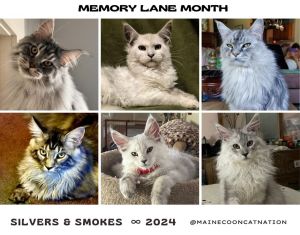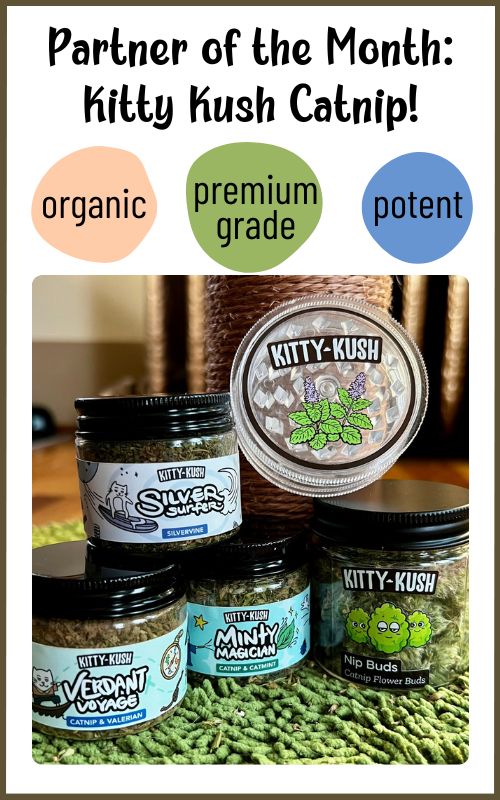- Home
- Maine Coon Grooming
- Excessive Grooming Questions
- Cat Pulling Out Fur?
Cat Pulling Out Fur?
Noticing your cat pulling out its own fur can be alarming. Is it stress? Allergies? Something medical? While occasional grooming is normal, excessive licking or chewing that leads to bald spots is a sign something’s off.
Signs Your Cat’s Fur-Pulling Is a Problem
Some hair loss can be expected, especially during shedding seasons, but these signs suggest a deeper issue:
- Patchy hair loss or complete bald spots
- Excessive licking or chewing in one area
- Redness, scabs, or irritated skin
If your cat is obsessively grooming, it’s time to look at possible causes.
What’s Causing the Behavior?
🐾 Flea Allergy (Always Check First!): Even if you don’t see fleas, a single bite can trigger intense itching in sensitive cats. Some continue scratching even after the fleas are gone, either from habit or lingering irritation.
🐾 Habitual Over-Grooming: If a cat had a bad flea infestation or another skin irritation in the past, they may have developed a compulsive grooming habit that persists long after the original issue is resolved.
🐾 Allergies & Skin Sensitivities: Food allergies, dust, pollen, or even certain cleaning products can cause itchy skin.
If your cat’s fur-pulling is seasonal or happens after eating certain foods, allergies could be the culprit.
🐾 Stress & Anxiety: Major changes (moving, new pets, different routines) can trigger excessive grooming as a self-soothing behavior.
Boredom can also contribute - some cats lick out of habit when they have nothing else to do.
🐾 Medical Conditions: Hyperthyroidism, hormonal imbalances, and even arthritis pain can lead to over-grooming.
If there’s no clear external cause, a vet visit can help rule out underlying health issues.
🐾 Dry Skin & Overbathing: Some cats experience dry, flaky skin due to low humidity, frequent bathing, or the wrong type of shampoo. If skin looks dry, a vet-approved moisturizer may help.
What’s Next? When to See a Vet
If the fur-pulling is mild and linked to stress or dry skin, try enrichment activities or a diet change first.
But if your cat has sores, excessive hair loss, or persistent itching, a vet can determine whether it’s medical or behavioral - and help find a solution.
From The Community: Questions About Cats Pulling out Fur
Cat Pulling Out Fur
By: Mic in Ohio
Is it normal for a cat to pull out fur while grooming? My cat, Mishi, does this daily, especially from her chest.
Reply:
Hi Mic,
What you’re describing sounds like typical grooming, especially for a long-haired cat. Maine Coons have thick undercoats, and loose fur often gets caught in all that fluff. When they groom, they naturally pull it out with their tongue - hence, hairballs!
If you haven’t tried one yet, a FURminator deshedding tool can really help.
It removes loose fur before Mishi does, reducing hairballs and excessive grooming.
However, if she’s pulling out fur to the point of bald spots or showing signs of distress, it could be a behavioral or medical issue.
Stress, allergies, or skin irritation might be at play, so a vet visit would be a good idea.
Sometimes, cats also bite and chew when working out a tangle. If she's focused on one spot but not overdoing it, it may just be her way of handling mats.
Hope this helps!
~Carrie
Comments:
Robert Does This Too!
Good morning! I thought my cat, Robert, was the only one!
Mic:
Yes! She uses her teeth to pull fur from her chest, different from her regular grooming. I was just wondering if it’s normal. I think I’ll look into a good brush.
Maine Coon Cat Nation:
Oh, I know exactly what you mean! Our cats do it too—often biting rhythmically, breathing deeply, and really working at a spot. It’s usually just them loosening a tangle.
Mic:
Yes, but Mishi actually pulls tufts of fur out. She still has her beautiful grey mane, but I keep telling her to stop!
Pulling Fur Out - Normal?
Maine Coon Cat Nation:
Yep, ours do that too! They usually just get rid of a tangle and move on. Sometimes, I even have to pull the fur from their mouths! It happened more often before we started using the FURminator - seriously a game-changer.
~Carrie
Maine Coon Pulling Out Fur
By: Bob McDonald, Green Valley, AZ
Our Maine Coon started pulling out large chunks of fur about two months ago. We have no idea why, but otherwise, he seems perfectly healthy.
Reply:
Hi Bob,
Sudden fur pulling can be caused by medical or behavioral issues. Have you checked with your vet?
If you’re seeing bald patches but not actually watching him pull the fur out, it could be a reaction to something like a topical flea treatment.
There are also allergies, stress, or underlying health concerns to consider. Sometimes, these things resolve on their own, but a vet visit is the best next step.
Hopefully, other cat owners can share their experiences too!
~Carrie
Comments:
Barbara (TN):
My Maine Coon mix started pulling fur from the base of her tail about a year ago. The vet ruled out worms and gave her a steroid shot, which only helped for a week.
We tried an allergy approach—switching laundry detergent, cutting out human food (she was not happy), and treating for fleas, even though we didn’t see any. Nothing worked.
Now, we give her a fish oil capsule every other day, which seems to help a little. The fur pulling is now more on her back and sides instead of just her tail.
I wish I had a clear answer - it’s tough seeing her do this and finding fur all over the house!
John (East Yorkshire, UK):
Our Maine Coon started pulling fur out at age 2. After spending over £1,000 on vet tests, we learned he was actually biting close to the skin rather than fully pulling it out.
The vet initially blamed adolescence, but he still does it occasionally at age 4.
Stress seems to trigger it - if we shut him out of a room or don’t let him outside in the evening, we find tufts of fur. A stray unneutered cat in our area also made things worse.
What’s helped:
- Keeping calm - when we stress about it, he does it more.
- Distracting him with attention or a quick hand clap.
- Using a Feliway plug-in, which releases calming pheromones. It’s made a big difference.
Otherwise, he’s a happy, healthy cat. Hope this helps!
Rico’s Owner:
My 16-year-old Maine Coon, Rico, recently started pulling fur from his back. At the same time, I’ve noticed his tongue feels very dry - almost like sandpaper - and he’s drinking excessively.
I was hoping to find some answers here, but I guess it’s time for a vet visit. I’ll update if I learn anything useful.
Constant Licking & Losing Fur
By: Ray in NJ
Our 3.5-year-old spayed Maine Coon is constantly licking and grooming herself. She’s an indoor cat with no signs of fleas and eats only dry Science Diet. We keep finding hairballs around the house. Any suggestions?
Reply:
Hi Ray,
Excessive grooming is often caused by skin irritation or behavioral issues.
- Skin-related causes: Allergies, dry skin, fleas (even if you don’t see them), or infections. A vet visit can help rule these out.
- Behavioral causes: Stress or anxiety can lead to over-grooming, which may require distraction techniques or calming aids.
You might try a Feliway diffuser to reduce stress or an Omega-3 supplement (like Nordic Naturals) for skin health. The hairballs are a side effect of all the licking, but a tuna-flavored hairball gel can help in the meantime.
Hope this helps!
~Carrie
Comments
Tricia:
My Maine Coon went through a phase of over-grooming last year - his thick coat and mane thinned out dramatically. Then, just as suddenly as it started, he stopped, and his fur grew back. I still have no idea what caused it!
Jessy:
My cat did this last year and again recently. No fleas, no obvious cause. At first, I thought it was grief-related (her buddy passed away before Christmas), but the vet said stress-related hair loss would have shown up sooner.
They suspect kidney issues or arthritis since she’s a senior.
MC’s Are Just Clean Cats!
In my experience, Maine Coons are extra fastidious. My last MC mix was the same way, and my current full-blooded Maine Coon, Eli, cleans constantly—himself, my son, even our Ragdoll!
The funniest thing? Eli actually tackles our Ragdoll after he uses the litter box and forcibly cleans him! It’s a little gross, but also kind of adorable.
Write your own page here: Cat Questions.
Recent Articles
-
New Memory Lane Posts!
Apr 22, 25 07:05 PM
Meet our stunning silver and smoke Maine Coons, from fluffy kittens to regal adults. These beauties were all submitted by our readers in 2023 & 2024!
Meet Bertie and Telulah: A Delightful Maine Coon M… -
Memory Lane Success Stories
Apr 21, 25 03:25 PM
As we continue to stroll down Memory Lane, today we feature some of our 2023 Coonies who have charmed their way into the hearts of their families. From Jojo, the clever cameo who still amazes his owne… -
Memory Lane Features
Apr 19, 25 12:12 AM
Perfect for Flashback Friday we have two fresh updates today!
Falling In Love With Georgina: Georgina is a stunning Maine Coon from Australia with royal energy, dramatic coloring, and a personality th…


